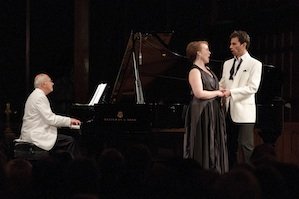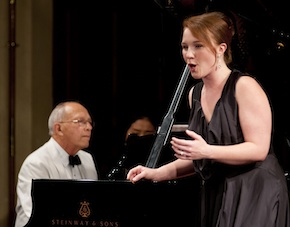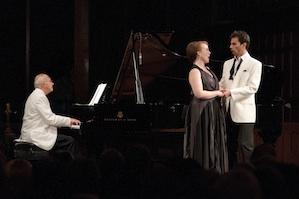
Photos by Tristan Cooke
Opportunities to hear two gifted vocalists who are also life-partners perform duets in recital come far too seldom. Thus, Music@Menlo’s dual recital by mezzo-soprano Sasha Cooke and her husband, baritone Kelly Markgraf, accompanied by the estimable Gilbert Kalish, drew a full house to the live acoustic of Palo Alto's St. Mark's Episcopal Church.
The loyal audience members at Music@Menlo, who have gotten to know each other over a decade of attending and supporting the same sold-out concerts, greeted the couple with open arms. In the three final love duets from Jerome Kern and Oscar Hammerstein II’s Showboat, the conclusion of a set sung entirely in English, the simple gestures of romance — waltzing together and glances of affection — were greeted with oohs, ahhs, applause (during the piece!), and, at the recital’s conclusion, whistles plus a standing ovation. But for those who wanted more than smiles, frowns, and beautiful sounds, the waltz never got off the ground.
Cooke and Markgraf: Gifts and Limitations

Cooke’s voice is of uncommon warmth and plushness. Grounded, smooth, and relaxed, its lush blanket of sound thrives in large, resonant venues such as Davies Symphony Hall. In such environments, including the venue in which she recorded her new CD for Yarlung Records, If You Love For Beauty, a collection of music by Adams, Handel, Mahler, and Chausson that is also available as a high-resolution download, her instrument truly comes across as a one-in-a-million sound.
Markgraf’s instrument, in turn, balances his wife’s warmth with darkness. It’s a very masculine sound, as cultivated as hers, and striking in its martial aspects.
Listen to the Music
Together, these voices seem destined to create an artistic experience of maximum contrast and timbral variety. Yet they made for something far less in their opening duet, Robert Schumann’s five-minute “Ich bin dein Baum, o Gärtner” (I am your tree, oh gardener) from Minnespiel, Op. 101. Undoubtedly due to nerves, this loving exchange sounded as if sung with a high brick wall between tree and caregiver. The notion of blend seemed an afterthought or, in this case, left to the gifted Kalish to somehow magically accomplish.
In three songs by Edvard Grieg that reflected his Norwegian heritage, Markgraf sounded strangely muffled, as if a blanket had been thrown over his vowels. If the single verse of the familiar “Jeg elsker dig” (I love you) zipped by with little consequence, it was because Markgraf’s dark, surprisingly grave tones seemed far more suited to the militaristic marches of Mahler’s Des Knaben Wunderhorn than to songs of love. Grieg’s notes and Hans Christian Andersen and Henrik Ibsen’s lyrics spoke of warmth and vulnerability, yet Markgraf’s voice emphatically proclaimed impenetrable hypermasculinity.
Cooke’s five songs by Johannes Brahms included several great ones. “Sapphische Ode,” which Brahms wrote for the great contralto Ernestine Schumann-Heink (whose tremendous outpouring of flawless coloratura was once likened to Niagara Falls), seemed ideally suited for Cooke’s gorgeous instrument until metric sameness rendered the beautiful melody prosaic. The song’s ending, “Doch auch dir, bewegt im Gemüt gleich jenen, Tauten die Tränen” (But you, too, moved in spirit as they were, Shed a dew of tears), was a special disappointment, the seven connected notes of “Tränen” sounding less like delicate, subtly differentiated teardrops than a steady, distinctly uninteresting stream.
Together, these voices seem destined to create an artistic experience of maximum contrast and timbral variety.
That may sound unduly harsh. But when a song such as “Nicht mehr zu dir zu gehen” (To visit you no longer) ends with the proclamation (in English) “Only reveal your feeling to me — your true feelings!” but sounds as if the singer is refusing to let anyone in, there is a major disconnect.
Kalish played his heart out in “Die Mainacht” (The May night), but Cooke too often sounded matter-of-fact. Nor could she supply the radiant, transcendent ending that “Unbewegte, laur Luft” (Motionless, balmy air) demands. Motionless and balmy she got just fine — the beginning of the song was gorgeous, and the high notes were beautiful — but farther she could not go.
Down, Up, and Then …
Listen to the Music
Disappointment (Markgraf) and triumph (Kalish) followed in the seven Liederstrauss of Hugo Wolf, where too often words and face said one thing, and voice said another. Unintended farce followed in Cooke’s rendition of Francis Poulenc’s Cinq poems de Max Jacob, when her request that the audience pay particular attention to the printed lyrics greeted aging eyes already strained beyond their limits in futile attempts to read the handout’s small, gray print in the church’s inadequate light (boosted in the second half after a number of us implored the house manager for relief). It would have been nice if she had announced, at the same time, that she had changed the order of the songs. Instead, she lightened her tone and smiled her way through, having a grand time as the majority sat clueless in the dark.
The triumph of the evening came with Markgraf and Kalish’s rendition of Ned Rorem’s War Scenes, to text from Walt Whitman’s Specimen Days. Here, the baritone’s martial timbre and rarely tempered directness, coupled with Kalish’s force, drove home the marriage of Whitman’s heartbreaking prose and Rorem’s unadorned song. Cooke did almost as well in George Crumb’s surprisingly romantic Three Early Songs, where lovely sounds count for a lot.
If the singer is refusing to let anyone in, there is a major disconnect.
But the anticlimax came as the showboat plunged into the ole Mississippi. Hammerstein’s simple lyrics and Kern’s marvelous melodies demand, above all, charm and naivete. Markgraf and Cooke may have looked carefree, but they sure didn’t sound it. I have never heard a more antiromantic rendition of “You Are Love,” nor a “Why Do I Love You?” so lacking in charm. And let’s face it. When three strophic duets that end, in typical Broadway fashion, with full-voiced high passages are instead sung by a duo that drops down when it should ascend to the grand climax, the big pop goes poop.

